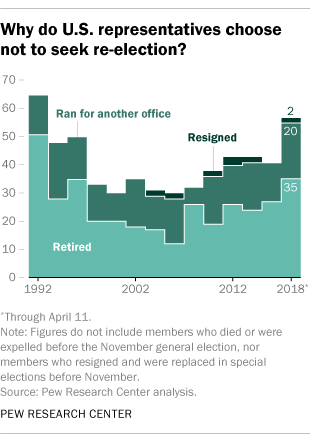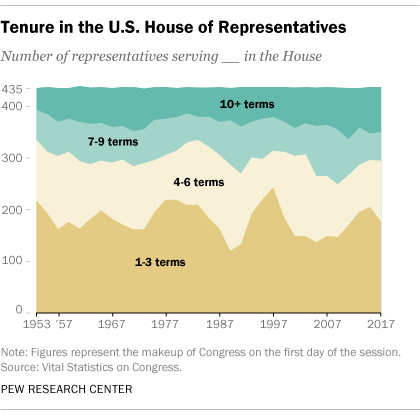Republicans Not Running Again in 2018

 Firm Speaker Paul Ryan'due south announcement Wednesday that he would not seek re-election adds a big name to what was already shaping upwardly to be a near-record year of seat turnovers in the U.Southward. Firm of Representatives. More Business firm members are choosing non to run for re-election to that torso than at any fourth dimension in the past quarter-century – including a tape number of Republicans, according to a Pew Research Heart assay.
Firm Speaker Paul Ryan'due south announcement Wednesday that he would not seek re-election adds a big name to what was already shaping upwardly to be a near-record year of seat turnovers in the U.Southward. Firm of Representatives. More Business firm members are choosing non to run for re-election to that torso than at any fourth dimension in the past quarter-century – including a tape number of Republicans, according to a Pew Research Heart assay.
Equally of Apr 11, 55 representatives (38 Republicans and 17 Democrats) have announced they're non running for new terms, according to our count. In addition, one Republican (Blake Farenthold of Texas) and 1 Democrat (John Conyers of Michigan) have resigned. That makes a total of 57 voluntary departures, or 13% of the Business firm's full voting membership.
Those counts could ascent further, since the filing deadlines in several states haven't yet passed. Yet, the number of retirements so far this twelvemonth is the most since 1992, when 65 representatives (41 Democrats and 24 Republicans) chose non to pursue re-ballot; 51 retired outright, while 14 decided to run for some other office. Based on our analysis and a tally going back to 1930 compiled by Vital Statistics on Congress, 1992 is the record year for voluntary Firm departures.
The 38 Republicans who are leaving the Business firm by choice after this year – including Wisconsin's Ryan, the speaker since October 2015 – are the most for the GOP since 1930. (This year's tally doesn't include two currently vacant seats that had been held by Republicans who have resigned, since those seats will be filled by special elections earlier November and the winners presumably will seek full terms every bit incumbents. Conyers' seat, all the same, won't be filled until Election Day in November, and it's unclear whether at that place volition be a special ballot for Farenthold's seat before so.)
 Of the 55 representatives who've called not to seek re-election to the House this November, twenty are running for other offices instead – xi for U.South. Senate and nine for governor of their state. (Ane representative, Maryland Democrat John Delaney, says he'll run for president in 2020, just that'due south a long style off and then for now we're counting him equally a direct retirement.) The 35 retirements so far this year are the most since 1996, when the same number of House members left without seeking another role.
Of the 55 representatives who've called not to seek re-election to the House this November, twenty are running for other offices instead – xi for U.South. Senate and nine for governor of their state. (Ane representative, Maryland Democrat John Delaney, says he'll run for president in 2020, just that'due south a long style off and then for now we're counting him equally a direct retirement.) The 35 retirements so far this year are the most since 1996, when the same number of House members left without seeking another role.
For this analysis, nosotros combined several lists of departing House members (such as those from The Atlantic and the House Printing Gallery) and verified the names through media reports; we likewise drew on information for past years that nosotros gathered in 2014. Not included in the count were what might exist called "involuntary departures" – where members died or (in one case) were expelled as well soon to fill their seats via special ballot before the November general. (Democrat Louise Slaughter of New York died in March; it's not clear whether there volition be an early special election for her seat.)
At the time of his resignation in Dec 2017, Conyers was the "dean of the Business firm" – the fellow member with the longest continuous service in that sleeping accommodation. Conyers served 52.9 years in the Firm, making him the tertiary-longest-serving representative in U.South. history. Other long-serving members hanging up their spurs this year include Sander Levin, D-Mich. (36 years in the House), Joe Barton and Lamar Smith, both R-Texas (34 and 32 years, respectively), and Jimmy Duncan, R-Tenn. (30.2 years). All told, the 35 retiring members correspond 588.6 years of House experience walking out the door (bold they all consummate their electric current terms).
 On average, the retiring members have xvi.8 years of House experience (once again, assuming they all complete their terms), compared with 7.6 years for the members leaving to seek another office, and an boilerplate of x.7 years for the members seeking re-ballot. Among all electric current members, the boilerplate tenure amid Democrats is 12.7 years, versus 9.7 for Republicans; amidst the retiring members, tenure averages fifteen.iv years for Democrats, 17.iv years for Republicans.
On average, the retiring members have xvi.8 years of House experience (once again, assuming they all complete their terms), compared with 7.6 years for the members leaving to seek another office, and an boilerplate of x.7 years for the members seeking re-ballot. Among all electric current members, the boilerplate tenure amid Democrats is 12.7 years, versus 9.7 for Republicans; amidst the retiring members, tenure averages fifteen.iv years for Democrats, 17.iv years for Republicans.
The spate of House members opting not to run for re-election this year has prompted much commentary speculating on what it might or might not hateful for Democrats' hopes of regaining control of the chamber. Only large numbers of retirements don't necessarily portend big changes in the House's partisan makeup, based on a review of election results since 1992.
Over that timespan, there have been three elections that saw enough seats switch parties to shift control of the Firm. In 1994, a net 52 House seats swung from Democratic to Republican as the GOP took command for the offset fourth dimension in more than four decades. Democrats regained control in 2006, when they picked up 30 Republican seats, simply to lose it once again in 2010 when a internet 63 seats turned from blue to red.
None of those elections were marked past particularly large numbers of voluntary departures. In 1994, 48 representatives chose to leave the House by retiring, resigning (without replacement) or running for some other office – not many more the 1992-2018 boilerplate of 41. Simply 30 representatives passed on re-election bids in 2006 (less than 7% of the Firm), and 38 did and then in 2010. On the other hand, while 1992 remains the record year for voluntary departures, the GOP gained just a net 10 seats from Democrats in that yr'due south elections.
And picking off seats opened upwardly past retirements, resignations or seeking other offices has not been a major factor behind the well-nigh contempo shifts in Firm control. In 2010, only xiii of the 66 Democratic seats that flipped to the GOP were open; just vii of the 30 Republican seats that Democrats captured in 2006 to retake the Business firm were open. In 1994, Republicans won 21 open Democratic seats, but it was the 35 Democratic incumbents they crush that gave them the bulk.
Note: This is an update to a postal service originally published on March 1, 2018.
Source: https://www.pewresearch.org/fact-tank/2018/04/11/near-record-number-of-house-members-not-seeking-re-election-in-2018/
Post a Comment for "Republicans Not Running Again in 2018"